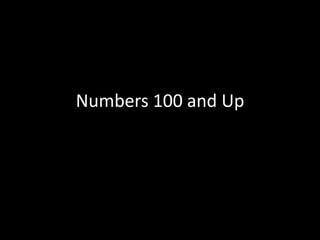
3-Numbers 100 and up (recorded)
- 1. Numbers 100 and Up
- 3. Cien/Ciento Cien = 100, beyond 100 use ciento Ciento + number 1-99; doscientos + number 1-99; trescientos + number 1-99, etc. Example: cientoochenta y tres(183). Cien is also used when counting large numbers: Cien mil, cuatrocientosochenta y tres (100, 483). Cienmillones, cuatrocientosochenta y tres mil, trescientosveintidos(100,483,322).
- 4. 200 – 900 With Nouns When these numbers modify a noun, they must agree in gender Doscientascuarenta y tresmuchachas (243) Cuatroscientosveinticincocoches (425) Novecientassetenta y trespelotas (973)
- 5. Mil Mil = “one thousand” or “a thousand”, there is no plural form like Millón (singular) Millones (as in tresmillones) (plural) But Mil perros(1,000) Cuatro mil perros (4,000)
- 6. Millones When modifying a noun, “de” must be used with “millones” Tresmillones de estudiantes. Ciento veintiochomillones de habitantes.
- 7. Years 1989 = mil novecientosochenta y nueve 2008 = dos mil ocho 1492 = mil cuatrocientosnoventa y dos